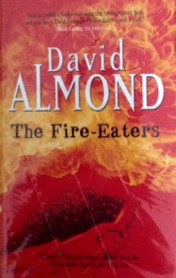Inspiring Young Readers
 posted on 01 Jul 2016
posted on 01 Jul 2016
The Fire-Eaters by David Almond
This is a polished gem of a novel that rather took me by surprise. I loved Skellig and Clay but I’d never got around to Almond’s other work and, in truth, I only picked this one up because I needed something to pass an hour or two. And boy am I glad I did – that hour or two turned into the timeless experience of reading the book at one sitting and, I have to say, I was completely bowled over by it.
Set in Almond’s native North-East, on the coast north of Newcastle, this is a story of transition and rights of passage. It is also a story of the mystery and magic of existence which sits alongside the everyday, mundane ‘reality’ of our lives. Those of you who saw the U.S. television series, The Wonder Years, will almost certainly feel a hint of recognition in the themes covered here and the way in which the, now adult, narrator transports us back to a key summer and autumn of his childhood in order to explore how the child made the man.
The story told by Robert Burns (Bobby) centres on the summer of 1962 and the overbearing anxiety created by the Cuban missile crisis. It’s also the last summer before Bobby starts his new Catholic secondary school having passed his 11+ exams. The cast of characters at the heart of Bobby’s story include his mother and father, his lifelong boyhood friends, Ailsa and Joseph and the new incomers from Kent, the middle-class Gower family and their son, Douglas, who is joining Bobby at school. Also at the heart of the story is McNulty, the mysteriously shell-shocked and traumatised ex-soldier who has become an eccentric fire-eater and fakir who performs on the streets for money and sleeps rough.
Not only is Bobby having to deal with his fear of nuclear annihilation and other emotional transitions in his life, he also has to come to terms with the mysterious and looming illness of his father. Over the course of the summer he spends time with the older, controlling Joseph and the fascinating Ailsa who loves him and who is deeply spiritual and even, Bobby believes, capable of magic.
Essentially Bobby doesn’t want to grow up and would rather see the world as a magical or spiritual place that can be controlled by prayer or incantation but circumstances are forcing him to face the inevitability of the adult world. His brushes with the idea of death – the potential personal tragedy of his dad, McNulty's self destructive instincts and the global terror of nuclear war – force him to fall back on religion and superstition to buffer him from reality but he must ultimately face what the world has to in store for him. He discovers that his new school provides no haven from the adult world as he falls foul of the brutal and sadistic teachers who practice a perverse and violent form of muscular Christianity and he learns how ultimately you have to stop being a victim and take a stand.
I’m trying hard not to tell you too much about the story because you’d curse me if I punctured any of the power of the novel and tipped you off about how it plays out – but, trust me, it’s a belter. The book ends with an elegiac tone somewhere between happiness, regret and a sense that boundaries have been crossed that cannot be re-crossed. The best thing I can say about it in terms of a recommendation is to say that I didn’t want it to end and I would have been happy to spend a whole lot more time in the world Almond has created here. There’s something of Bobby in us all – we have all had the equivalent of Robert Burns’ 1962 and when we look back – recollecting in tranquillity – we are forced to recognise that our journey to awareness and knowledge must always mean we have to leave something magical behind.
Terry Potter
July 2016